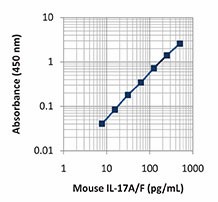- Regulatory Status
- RUO
- Other Names
- IL-17A/F Pre-coated ELISA Kit
- Ave. Rating
- Submit a Review
- Product Citations
- publications

| Cat # | Size | Price | Quantity Check Availability | Save | ||
|---|---|---|---|---|---|---|
| 436207 | 1 Pre-coated Plate | 409 CHF | ||||
IL-17A/F is a heterodimer of IL-17A and IL-17F, two of the most studied members of the IL-17 family, consisting of at least six proinflammatory cytokines. Among the IL-17 family members, IL-17A and IL-17F share the highest sequence homology of 50%, and they are located on the same chromosome region. Earlier studies have shown that both IL-17A and IL-17F are produced as homodimers by Th17 cells, an activated subset of CD4+ T cells. However, recent studies demonstrate that the IL-17A/F heterodimer is also produced in Th17 cells, as a 40 kD, secreted, disulfide-linked glycoprotein.
Functionally, IL-17A/F heterodimers signal through the same receptor as IL-17A and IL-17F homodimers and induce similar biological responses. However, both mouse and human IL-17A demonstrate more than 100-fold higher biological activity than IL-17F, while IL- 17A/F has intermediate activity. Both IL-17A and IL-17F have been associated with many inflammatory diseases in humans such as rheumatoid arthritis, multiple sclerosis, psoriasis, inflammatory bowel disease, and asthma. The exact cellular functions of IL-17A/F and its role in the disease processes are still not very clear. A convenient and ready-to-use IL-17A/F kit will be a very useful tool for those involved in the IL-17A, IL-17F, and IL-17A/F research efforts.
BioLegend’s LEGEND MAX™ Mouse IL-17A/F ELISA Kit is a sandwich Enzyme-Linked Immunosorbent Assay (ELISA), in which a Mouse IL-17A specific monoclonal antibody is pre-coated on a 96-well strip-well plate.
BioLegend’s LEGEND MAX™ Mouse IL-17A/F ELISA Kit is specifically designed for the accurate quantitation of mouse IL-17A/F from cell culture supernatant, serum, plasma, or other bodily fluids. It is ready-to-use, accurate, sensitive, and cost-effective.
Kit Contents
- Kit Contents
-
- Anti-Mouse IL-17A/F Pre-coated 96-well Strip Microplate
- Mouse IL-17A/F Dectection Antibody
- Mouse IL-17A/F Standard
- Avidin-HRP D
- Assay Buffer A
- Wash Buffer (20X)
- Substrate Solution F
- Stop Solution
- Plate Sealers
Product Details
- Verified Reactivity
- Mouse
- Application
-
ELISA
- Product Citations
-
- Sensitivity
- 2.3 pg/mL
- Standard Range
- 7.8-500 pg/mL
- Materials Not Included
-
- Microplate reader able to measure absorbance at 450 nm
- Adjustable pipettes to measure volumes ranging from 1 µL to 1,000 µL
- Deionized water
- Wash bottle or automated microplate washer
- Log-Log graph paper or software for data analysis
- Tubes to prepare standard dilutions
- Timer
- Plate Shaker
- Polypropylene vials
Antigen Details
- Cell Sources
- Th17 cells, an activated subset of CD4+ T cells
- Biology Area
- Immunology, Neuroinflammation, Neuroscience
- Molecular Family
- Cytokines/Chemokines
- Gene ID
- 16171 View all products for this Gene ID 257630 View all products for this Gene ID
- UniProt
- View information about IL-17A/F on UniProt.org
Related FAQs
- In your LEGEND MAX™ ELISA Kits, there is a step that calls for washing the plates before adding sample. What is the purpose of this step?
-
We typically use a stabilizer for pre-coated plates. The additional washing step is designed to remove these components before you start the assay. If you do not perform the washing, the effect on assay performance is negligible.
- I have multiple LEGEND MAX™ ELISA kits that I want to run simultaneously. Can I use the same wash buffer for all the kits?
-
The wash buffer provided in all our LEGEND MAX™ kits is the same and the part numbers on the wash buffer bottles in these kits should be identical. For ELISA MAX™ Deluxe and ELISA MAX™ Standard Sets, we provide a recipe for the wash buffer on each kit’s technical data sheet. This recipe is the same for all ELISA MAX™ sets.
- For some of your ELISA kits, why do my serum samples require dilution with assay buffer?
-
In some cases, dilution with assay buffer is required to minimize the matrix difference between the samples and the standards to achieve better accuracy.
 Login / Register
Login / Register 









Follow Us